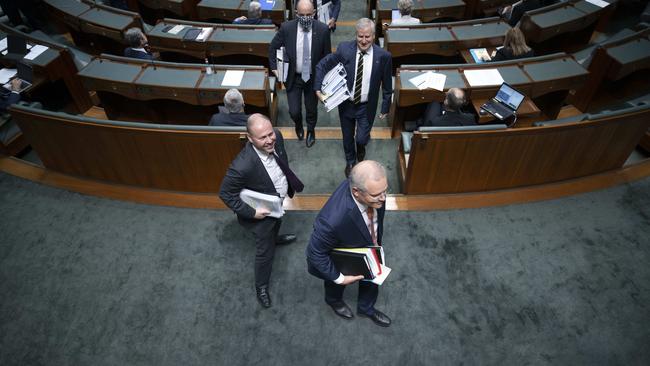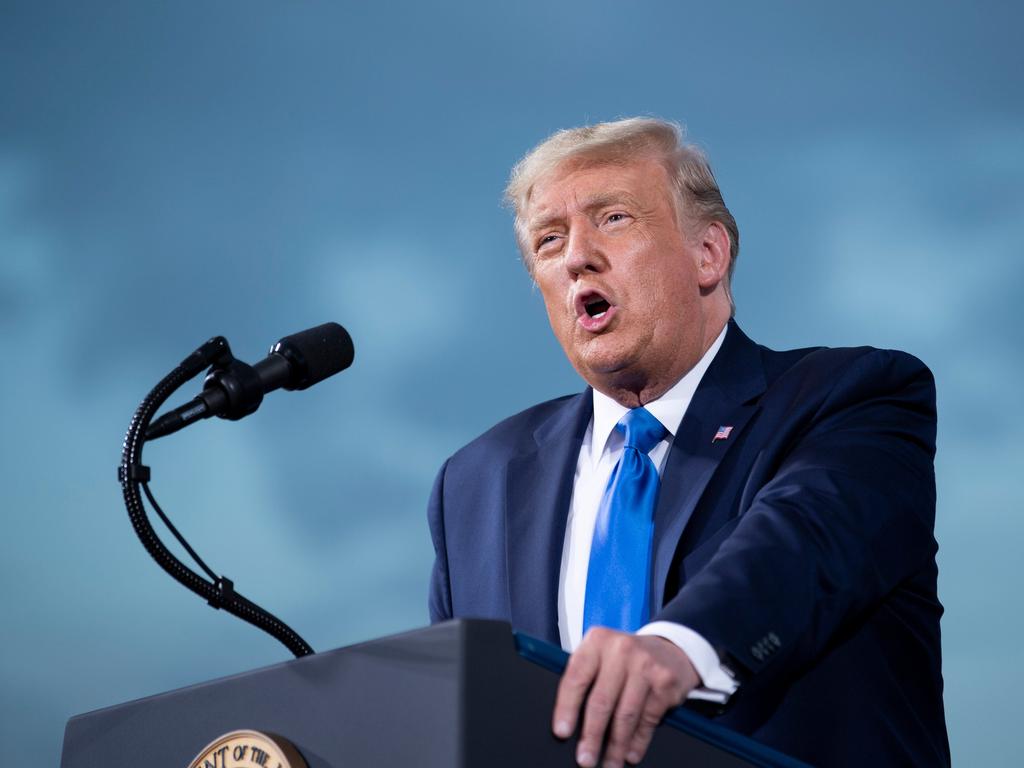Budget’s pandemic spending is the right thing to do
There is absolutely no comparison between the current pandemic recession and previous ones.

The same can be said about recessions. There is absolutely no comparison between the current pandemic recession and the recessions of 1974-75, 1982-83 and 1991-92, still less to the global financial crisis of 2008-09. You would expect mature and intelligent journalists to understand this point. But this was not universally evident in the wake of the budget handed down by Josh Frydenberg on Tuesday.
Take the Treasurer’s appearance on ABC TV’s 7.30 program shortly after he handed down the budget. Leigh Sales was in the presenter’s chair. An early question was as follows: “Net debt this year is going to be $703bn. By June 2024 it will be almost a trillion dollars. In the 2008-09 global financial crisis, and the years after, the Coalition aggressively and persistently attacked the then Labor government on the grounds that debt and deficit were signs of economic incompetence and mismanagement. Why shouldn’t I apply that same argument to you now?”
Sales was mightily impressed with her own question. So much so that she ran it — or variations of the same — on another eight occasions. It was put to Frydenberg that “Labor’s largest deficit was $54bn a decade ago; yours is four times that today”. And that the Coalition used to argue that the build-up of debt and deficit “was a sign of economic incompetence and mismanagement”. And that the Coalition’s past arguments had been proven to be “dishonest and cynical”. And so on.
In response, the Treasurer made the obvious but important responses. In the GFC of a decade ago the world economy contracted by 0.1 per cent. Currently the OECD is expecting the global economy to contract by 4.5 per cent. This isn’t an apples and oranges comparison, to borrow a cliche, but a distinction of the rocket and firecracker genre.
In Australia, gross domestic product shrank by 7 per cent in the June quarter (following a reduction of 0.3 per cent in the March quarter). This is a significantly better economic output than in Canada, New Zealand, France or Britain — but a severe recession nevertheless. In the GFC, Australia suffered only one quarter of GDP decline, meaning there was no recession. Right now, there have been two quarterly GDP declines, with more to follow.
There is an additional point of difference. In 2008-09, interest rates were significantly higher than today. Consequently, it was possible for the Reserve Bank to stimulate the economy by cutting the cash rate — it fell by 4.25 percentage points. No similar adjustment is possible now since interest rates were already very low when the economic downturn began.
The essential direction of Sales’s argument was to demonstrate that the Rudd Labor government was right to spend, borrow and build up debt in response to the GFC since this is “a legitimate tool of economic policy”. And that the Morrison government’s spend and borrow response to the pandemic recession indicates that it’s into double standards.
The Sales line was soon embraced by some of her colleagues at the public broadcaster. It was run the following morning by Fran Kelly on ABC Radio National Breakfast, and by Annabel Crabb the same day on ABC TV’s News Breakfast and in the newspapers segment of the same program.
It fell to media trainer and former journalist Steve Carey to review the post-budget print and online papers on News Breakfast on Wednesday.
He described the 7.30 presenter as having nailed it with a “valid and well-made” question to Frydenberg, asking: “How can you be sitting on one side of the fence throughout the GFC throwing stones at Labor and then do the same thing during a pandemic?”
The answer is easy to anyone other than the ideologically blinkered. The pandemic recession is unique. Never before in the history of Western democracies have democratically elected governments closed down large parts of the private sector.
Since men and women in the private sector have lost their businesses and their employees their jobs, governments have a duty to do as much as possible to revive businesses and restore employment.
This substantial economic retraction did not even exist during the Spanish flu pandemic when an estimated 15,000 mostly young Australians died out of a population of five million.
Moreover, there has never been an equivalent in Australia of the job-destroying and civil liberties-crushing lockdown that has occurred under Labor Premier Daniel Andrews in Victoria.
In view of this, Scott Morrison and his cabinet colleagues had no option but to spend big on projects and welfare support — especially when the economic impact of the pandemic recession is at what appears to be its height. The government knows well that the best response is for Australians to get back to normal life as soon as possible and the budget is intended to facilitate this.
It is fashionable to accuse the likes of the Prime Minister and his Treasurer of hypocrisy for throwing the switch to debt and deficit and breaching the Coalition’s traditional commitment to expenditure restraint and budget surpluses. But it’s nonsense.
Liberal Party founder Robert Menzies was prime minister at the outbreak of hostilities in September 1939. He immediately presided over an increase in defence expenditure and borrowed to finance it. It’s what all good governments do in response to economic or military crises.
Moreover, as Finance Minister Mathias Cormann commented on Sky News’ Credlin on Wednesday, the increase in spending in response to the pandemic recession is designed to cover just a few years up to 2022 before subsiding — unlike Labor’s action in the GFC, when spending continued beyond the time when it was most required. In other words, the responses to the GFC and the pandemic recession in Australia have not repeated themselves.
Gerard Henderson is executive director of the Sydney Institute. His Media Watch Dog blog can be found at theaustralian.com.au.







Despite the prevalence of the cliche “history repeats itself” — it rarely, if ever, does so. World War II was different from its predecessor. The Depression of 1929-31 was dissimilar from that of four decades earlier. And the Spanish flu of 1919-20 can be distinguished from the COVID-19 pandemic a century later.